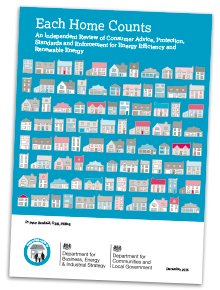Bonfield Review
On 16 December 2016, the long-awaited Bonfield Review, ‘Each Home Counts’ was published.
Originally launched in 2015 by the then-Department of Energy and Climate Change (DECC) in the wake of the failure of the Green Deal, the report has been criticised for numerous delays. The purpose of the review was to examine, and make recommendations, about how consumers can be protected and advised when installing energy efficiency and renewable energy measures in their homes.
There are 27 recommendations included in the review, including:
- There should be a single quality mark for all energy efficiency and renewable energy measures.
- The development of an information hub and data warehouse allowing consumers to access better data relating to their homes, leading to better advice.
- New approaches to engaging with consumers about renewables and energy efficiency through awareness raising at local and national levels.
- Embedding core knowledge into the industry, including building physics, and design stage and consumer interaction connected with the assessment of competence of businesses.
- A robust and joined-up industry-wide compliance and enforcement regime coordinated nationally to include on site monitoring or audits.
In response to the review, Sustainable Homes said:
‘The Quality Mark is a good thing for the industry, but it must have weight. If properly backed by enforcement then it will work. If it leads to quality as in the form of the best Passivhaus schemes then it will work. If it simply becomes a badge for installers to win more work then the Bonfield Review will have been for nothing.’
Brian Berry, Chief Executive of the Federation of Master Builders (FMB), said:
‘The energy efficiency and renewable energy sectors, like the wider domestic building industry, remain largely under-regulated, with too few checks to protect consumers from poor quality builders.
‘The FMB is fully behind the drive for higher levels of consumer confidence …. However, this quality and confidence alone will not be sufficient to drive the quantity of low carbon refurbishment which will be necessary to upgrade the UK’s housings stock and make sure the UK meets its legally binding target by 2050. We also need financial incentives from the Government to encourage home owners to invest in these improvements.’
[edit] Related articles on Designing Buildings Wiki
- Building engineering physics.
- Building Places that Work for Everyone.
- Construction industry reports.
- Eco towns.
- Energy Performance Certificates.
- Government urged to include home energy retrofits in Industrial Strategy.
- Green Deal.
- How to deal with retrofit risks.
- PAS 2035.
- PAS 2038:2021 Retrofitting non-domestic buildings for improved energy efficiency
- Performance gap.
- Retrofit.
- Retrofit coordinator.
- Sustainability.
- The Each Home Counts report and traditional buildings.
- Understanding the performance of solid walls.
- Zero carbon homes.
Featured articles and news
What they are, how they work and why they are popular in many countries.
Plastic, recycling and its symbol
Student competition winning, M.C.Esher inspired Möbius strip design symbolising continuity within a finite entity.
Do you take the lead in a circular construction economy?
Help us develop and expand this wiki as a resource for academia and industry alike.
Warm Homes Plan Workforce Taskforce
Risks of undermining UK’s energy transition due to lack of electrotechnical industry representation, says ECA.
Cost Optimal Domestic Electrification CODE
Modelling retrofits only on costs that directly impact the consumer: upfront cost of equipment, energy costs and maintenance costs.
The Warm Homes Plan details released
What's new and what is not, with industry reactions.
Could AI and VR cause an increase the value of heritage?
The Orange book: 2026 Amendment 4 to BS 7671:2018
ECA welcomes IET and BSI content sign off.
How neural technologies could transform the design future
Enhancing legacy parametric engines, offering novel ways to explore solutions and generate geometry.
Key AI related terms to be aware of
With explanations from the UK government and other bodies.
From QS to further education teacher
Applying real world skills with the next generation.
A guide on how children can use LEGO to mirror real engineering processes.
Data infrastructure for next-generation materials science
Research Data Express to automate data processing and create AI-ready datasets for materials research.
Wired for the Future with ECA; powering skills and progress
ECA South Wales Business Day 2025, a day to remember.
AI for the conservation professional
A level of sophistication previously reserved for science fiction.
Biomass harvested in cycles of less than ten years.
An interview with the new CIAT President
Usman Yaqub BSc (Hons) PCIAT MFPWS.
Cost benefit model report of building safety regime in Wales
Proposed policy option costs for design and construction stage of the new building safety regime in Wales.
Do you receive our free biweekly newsletter?
If not you can sign up to receive it in your mailbox here.

























